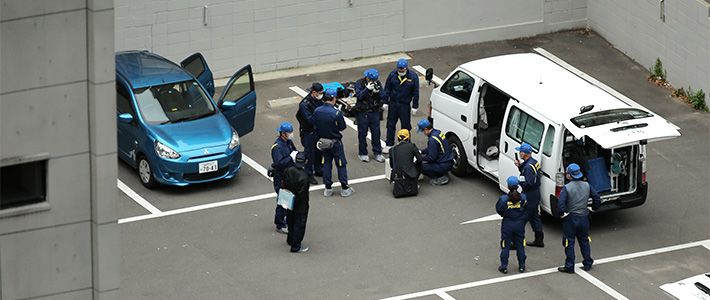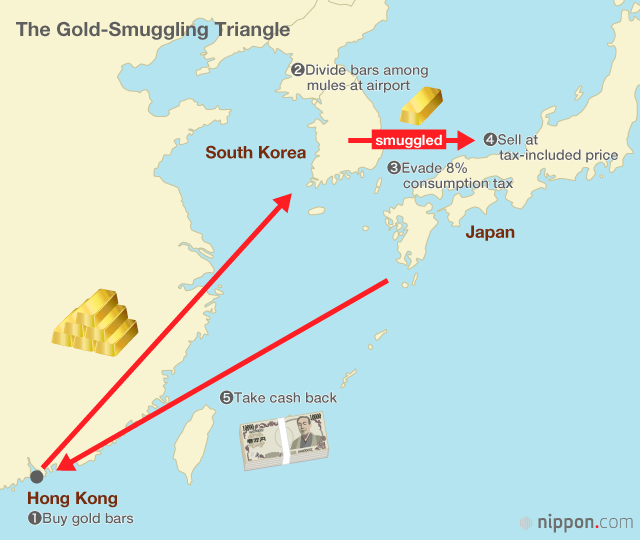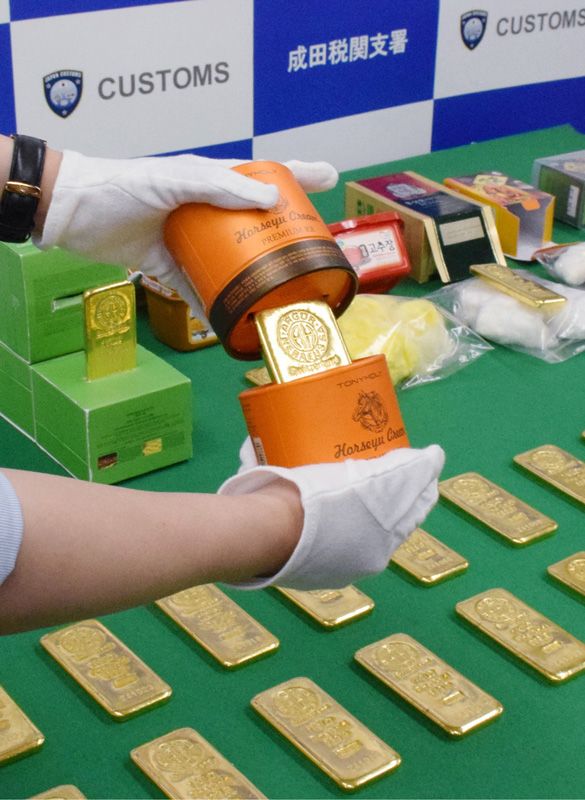
Golden Crimes: Growing Smuggling Problem Exposed by High-Profile Robberies
Society- English
- 日本語
- 简体字
- 繁體字
- Français
- Español
- العربية
- Русский
Gold Crimes in Fukuoka
Recent heists in Fukuoka have shone the spotlight on the shady gold trade in the Kyūshū city. In July 2016, men disguised as police officers took 160 kilograms of gold bars worth over ¥750 million in a roadside incident near the city’s main Hakata Station. Then in April of the following year, criminals made off with ¥380 million in cash—which had just been withdrawn from a nearby bank to exchange for gold—in a parking lot robbery in Fukuoka’s downtown Tenjin district.
In May 2017, 10 people mainly associated with a Nagoya hangure (non-yakuza) gang were arrested in connection with the first incident. From the end of October, 11 members of various groups in the greater Tokyo area and Osaka were apprehended in relation to the second. The link between the crimes and the gold trade, which is not well understood by the general public, is worthy of note in itself. What is more, in both cases the groups had prior knowledge of the transactions, which they used in precision planning of their crimes.
Nakagaki Ryūichirō was among the Nagoya gangsters arrested for the robbery near Hakata Station. He testified that someone he had got to know in prison approached him about faking a gold robbery as part of a tax dodge, and that the other party had agreed to the deception.
Police Disguises
A Fukuoka Prefectural Police officer involved in the investigation explains. “Nakagaki testified that he’d got the information from a fellow prisoner, but that by December 2016—five months after the incident, when the story had received major coverage—he’d lost contact with him. We suspect the original source was an even more distant connection, but we still haven’t got the full picture. In both cases, the person supplying the information said that the supposed victims had agreed to be part of the scam. It is possible they both had the same source.”
Nakagaki took the offer to criminal brothers Noguchi Naoki and Kazuki, who took a lead role in the robbery. They wanted confirmation that it was not yakuza money and that, because of the other party’s agreement, the police would not get involved. The source assured them that there was no yakuza connection and that the gold was smuggled, so there was no question of going to the police.
“When they went to look at the planned site for the crime, however, they saw that it was outside the station with people passing by all the time,” the investigating officer continues. “They couldn’t blatantly commit a robbery in broad daylight, so the Noguchis and others dressed as police officers, pretending to question the victims before stealing the gold. They exchanged 90 kilograms, worth around ¥430 million, for cash to split among the conspirators and gave the remaining 70 kilograms to the source. So far, everything had gone according to plan. But the robbery came to light with major media coverage several months later, sending them into a panic. ‘We thought they weren’t going to file a police report!’”
Nagoya Fall Guys
The Noguchi brothers are well-known underworld figures in their Nagoya base. As leaders of a hangure gang, they have a history of automobile and other theft, attracting the attention of police authorities. They are also known as free spenders with a taste for night life.
With a wide circle of acquaintance, the Noguchis seem to take some influence from local yakuza gangs and hangure groups in the Kantō region. They basically assembled a team for the Fukuoka job, however, from friends and associates. Lured by the prospect of easy money in what they believed was a mutually agreed gold heist, they ended up the fall guys of the whole affair.
So, who was pulling the strings behind the scenes?
“There was definitely some kind of mafia group elsewhere in Asia involved,” says the investigating police officer. “They’re systematically smuggling gold into Japan for huge profits. At the heart of it, there must be a leadership battle in the gold smuggling business. We believe it likely that someone gave out information about a rival’s transaction to set a trap.”
Profits in the gold business are simple and based around Japan’s 8% consumption tax. While in many other countries, gold transactions are not subject to consumption tax, in Japan they are. Domestic sales prices always include tax. Gold importers have to pay the tax at customs, but smugglers who bypass this requirement can achieve an 8% profit margin simply by selling at the tax-inclusive price.
A Gold-Smuggling Triangle
Gold smuggling has become a more attractive proposition since the Japanese consumption tax rose from 5% to 8% in April 2014. Its appeal will rise even more when the further hike to 10%, planned for October 2019, is complete.
Criminals purchase gold bars in Hong Kong, where there are no restrictions on carrying gold out or currency in, and fly to South Korea. In the transit area at Incheon International Airport, they divide the bars up among a number of “mules,” who convey them undeclared through Japanese customs. The gold is then sold in Japan at a price including the 8% tax, and the criminals take the cash back to Hong Kong.

Starting with ¥100 million worth of gold yields profits of ¥8 million. Then ¥108 million in gold can be turned into ¥116.64 million. The money soon mounts up. Although there are transportation and other basic costs, many smugglers conduct several transactions each week, allowing them to double their initial investment in just a month.
A String of Crimes
The incidents described above are just two examples of crimes connected to the gold trade. In March 2017, two employees of the city of Osaka were arrested trying to smuggle six kilograms of gold bars worth ¥27 million from South Korea. They said they had repeatedly engaged in smuggling in the spirit of a side job, after being asked to do so by a pachinko buddy.
Immediately after the Tenjin parking lot robbery, four South Koreans were apprehended while attempting to take ¥435 million in cash undeclared through customs. Fukuoka Prefectural Police stated that they were members of a large gold smuggling ring based in South Korea and that the cash appeared to be earnings from selling smuggled gold. In the course of the investigation, police learned that 30 mules boarded various flights from Incheon in one day, carrying a total of 150 kilograms of gold bars into Fukuoka.
Around the same time, there was another roadside incident in Ginza, Tokyo, where a bag containing ¥72 million in cash was stolen immediately after a gold transaction.
 Gold bars and fake cosmetics cases used in a smuggling attempt from South Korea on display on June 15, 2017, at Narita Airport in Chiba Prefecture. (© Jiji)
Gold bars and fake cosmetics cases used in a smuggling attempt from South Korea on display on June 15, 2017, at Narita Airport in Chiba Prefecture. (© Jiji)
The existence of a sea route emerged in May 2017 when investigators found 206 kilograms of gold in a squid fishing boat at a port in Karatsu, Saga Prefecture. It was identified as having been smuggled by a group including Chinese members.
The above represent only the crimes that have come to the surface. It is likely there have been many robberies where the victims could not make any report because of their own involvement in smuggling.
Ultimately, huge amounts of money that should be paid to the Japanese state in consumption tax is ending up in the hands of criminals.
(Originally published in Japanese on January 16, 2018. Reporting and text by Power News. Banner photo: A police team conducts an investigation on April 20, 2017, on the site of a robbery of ¥380 million in cash in Tenjin, Fukuoka. © Jiji.)